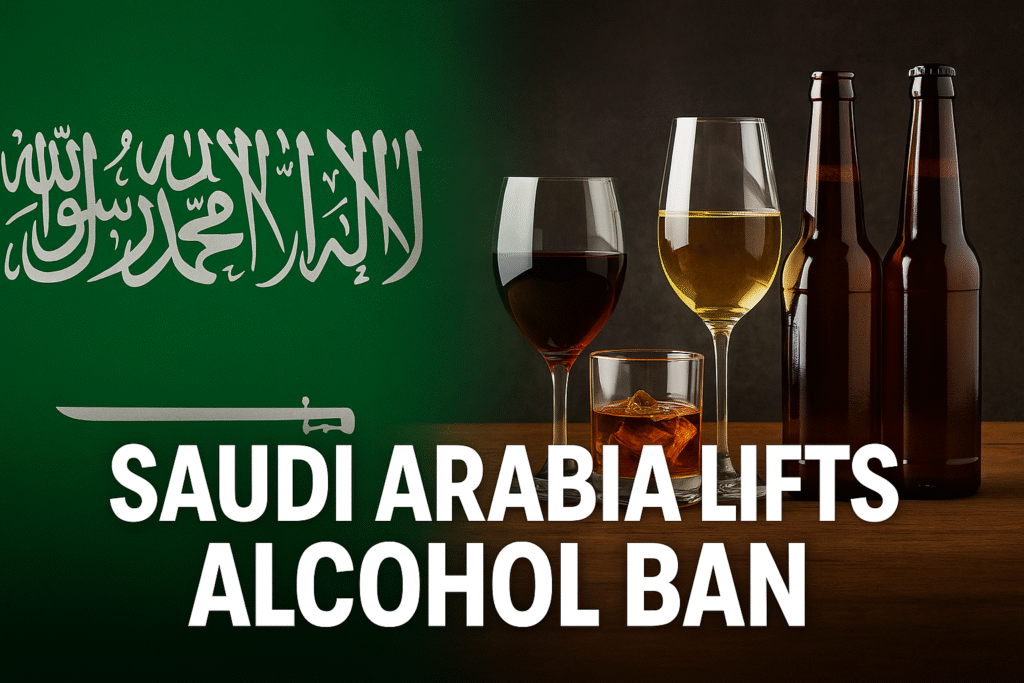
Saudi Arabia, a nation synonymous with strict Islamic laws and conservative societal norms, has always stood firm on its prohibition of alcohol. However, recent reports suggest a historic shift in this long-standing policy. The Kingdom, which enforced the alcohol ban in 1952, is now contemplating lifting it. This significant development raises questions about its implications, the history behind the ban, and the reasons driving this potential transformation.
The Legacy of the Alcohol Ban
The roots of Saudi Arabia’s alcohol prohibition lie deep within its religious and cultural framework. As the birthplace of Islam and the custodian of its two holiest cities, Mecca and Medina, Saudi Arabia adopted strict adherence to Sharia law. This includes the prohibition of intoxicants, which are explicitly forbidden in Islamic scripture.
In 1952, a series of events led to the official imposition of the alcohol ban. The most notable incident involved a Saudi prince—a member of the royal family—who was reportedly under the influence of alcohol during a public altercation. This scandal created a public outcry, compelling the government to impose a strict nationwide ban to uphold moral and religious values. The prohibition became a hallmark of Saudi Arabia’s commitment to preserving Islamic principles.
The alcohol ban did not emerge solely from this single incident. Historical records reveal a growing concern about the impact of alcohol on public order and morality during the early 20th century. Religious scholars and community leaders voiced their objections to the growing availability of alcohol in the region, urging the government to take decisive action. The 1952 ban was seen as a culmination of these efforts, solidifying the Kingdom’s identity as a guardian of Islamic values.
Life Under Prohibition
The alcohol ban has shaped Saudi society for decades. It is not merely a law but a deeply ingrained social norm. Violators face severe penalties, including hefty fines, imprisonment, and even public flogging. The strict enforcement of the ban has resulted in an underground market for alcohol, with smugglers risking significant punishment to meet the demand.
For expatriates and foreign workers, the absence of alcohol has been a notable cultural adjustment. Many Western expatriates, accustomed to more liberal environments, have had to navigate life without access to alcoholic beverages. The government’s uncompromising stance also extended to international events hosted in the Kingdom, where organizers were required to comply with local laws.
Despite these restrictions, anecdotal evidence suggests that alcohol consumption has persisted in private settings. Some residents have turned to homebrewing or sourcing alcohol through illicit channels, highlighting the challenges of enforcing a complete ban. The underground market has also posed public health risks, with incidents of poisoning and fatalities linked to the consumption of counterfeit or poorly made alcoholic beverages.
The Economic and Cultural Shift
Saudi Arabia’s Vision 2030, spearheaded by Crown Prince Mohammed bin Salman, marks a transformative era for the Kingdom. This ambitious reform plan aims to diversify the economy, reduce dependence on oil, and modernize society. As part of this vision, Saudi Arabia has introduced sweeping social changes, including allowing women to drive, opening cinemas, and hosting international music festivals.
The potential lifting of the alcohol ban is seen as a continuation of these reforms. Experts suggest that this move could significantly boost tourism and attract foreign investment. Alcohol availability in controlled environments, such as luxury resorts and international zones, could make Saudi Arabia more appealing to global travelers and expatriates.
Subheading: The Controversy Surrounding Alcohol in Islam
While Saudi Arabia’s decision to reconsider the ban aligns with its modernization goals, it has sparked intense debate. Alcohol prohibition is not merely a legal issue but a deeply religious one. Islamic scripture explicitly forbids the consumption of intoxicants, and many Saudis view the potential lifting of the ban as a betrayal of their religious heritage.
Opponents argue that allowing alcohol, even in controlled settings, could erode the country’s moral fabric. They fear that this policy change might open the door to other forms of Western influence, diluting the Kingdom’s Islamic identity. On the other hand, proponents argue that the controlled introduction of alcohol could coexist with traditional values, as seen in other predominantly Muslim countries such as the UAE and Qatar.
Religious scholars have played a central role in shaping public discourse on this issue. Some have argued that any relaxation of the alcohol ban contradicts the principles of Sharia law, which forms the foundation of Saudi Arabia’s legal system. Others, however, have emphasized the importance of adapting to changing circumstances, suggesting that controlled policies could prevent the harms associated with unregulated consumption.
The Global Perspective
The decision to lift the alcohol ban aligns with global trends among conservative societies adapting to modernity. Neighboring countries in the Gulf Cooperation Council (GCC), such as the UAE, have successfully integrated alcohol sales into their tourism and hospitality sectors while maintaining Islamic traditions. Dubai, for instance, has become a global tourism hub, attracting millions of visitors annually, partly due to its liberal alcohol policies in designated areas.
Saudi Arabia’s shift could position it as a competitive player in the regional tourism market. The Kingdom’s ambitious projects, including the futuristic city of NEOM and the Red Sea luxury resorts, are designed to attract high-spending tourists. Allowing alcohol in these zones could significantly enhance their appeal, making Saudi Arabia a more attractive destination for international travelers.
However, this shift also requires careful consideration of global public opinion. While some observers view the move as a pragmatic step towards modernization, others express concern about its potential impact on Saudi Arabia’s unique cultural identity. Balancing these perspectives will be crucial for the Kingdom’s leadership as it seeks to position Saudi Arabia as a global player in the tourism and investment sectors.
Subheading: Balancing Tradition and Modernity
The potential lifting of the alcohol ban poses a challenge: how to balance modernization with cultural and religious values. Saudi officials have reportedly considered introducing alcohol in controlled environments, such as exclusive resorts and international zones, to minimize its societal impact. This approach mirrors strategies employed by other Muslim-majority countries, where alcohol is available under strict regulations.
For many Saudis, the shift represents a cultural crossroads. While some embrace the changes brought by Vision 2030, others remain deeply skeptical. The government’s challenge lies in ensuring that reforms do not alienate its conservative base, which forms a significant portion of the population.
Public opinion surveys reveal a divided society. Younger Saudis, particularly those who have studied or traveled abroad, are more likely to support the lifting of the alcohol ban. They view it as a step towards greater personal freedoms and an opportunity to attract global talent. In contrast, older generations and rural communities tend to oppose the move, fearing that it could undermine the country’s traditional values.
The Economic Implications
The economic benefits of lifting the alcohol ban cannot be ignored. Tourism is a key pillar of Vision 2030, and the Kingdom aims to attract 100 million annual visitors by 2030. Alcohol availability in controlled settings could play a pivotal role in achieving this target. Industry experts predict that the introduction of alcohol could generate substantial revenue, create jobs, and stimulate economic growth.
Moreover, the move could enhance Saudi Arabia’s global image as a modern and progressive nation. This perception is crucial for attracting foreign investment and building international partnerships. By aligning with global norms, Saudi Arabia could position itself as a more accessible and welcoming destination for global investors and tourists.
Subheading: The Road Ahead
As Saudi Arabia contemplates this historic policy shift, the road ahead is fraught with challenges. Public opinion remains divided, and the government must navigate the complexities of implementing such a controversial change. Ensuring transparency and public dialogue will be essential to gaining public support.
The international community will also closely watch Saudi Arabia’s approach. If managed effectively, the Kingdom’s experience could serve as a model for other conservative societies grappling with similar issues. Conversely, missteps could lead to social unrest and reputational damage.
Efforts to engage religious leaders and community representatives will be critical. By involving key stakeholders in the decision-making process, Saudi Arabia can foster a sense of ownership and shared responsibility for the outcomes. Educational campaigns and public awareness initiatives can also help address misconceptions and build understanding about the reasons behind the policy shift.
Conclusion
Saudi Arabia’s potential decision to lift the alcohol ban marks a significant turning point in its history. Rooted in religious and cultural traditions, the prohibition has long been a defining feature of Saudi society. However, the Kingdom’s ambitious modernization goals and the evolving global landscape necessitate a re-evaluation of longstanding policies.
Balancing tradition and modernity is no small feat, and Saudi Arabia’s journey will undoubtedly be complex. Yet, the Kingdom’s willingness to engage in this transformation reflects its commitment to building a prosperous and inclusive future. As the world watches, Saudi Arabia’s path forward will shape its identity on the global stage and redefine its role in the modern era.
The move to lift the alcohol ban is not just about policy; it represents a broader narrative of change and adaptation. Whether this transition proves successful will depend on the government’s ability to navigate the delicate balance between innovation and preservation, ensuring that Saudi Arabia’s rich heritage remains a cornerstone of its bright future.

